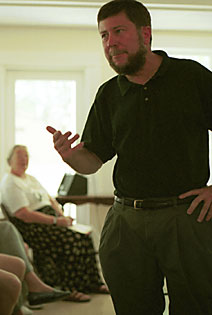 |
|
EMILY REID/Arizona Daily Wildcat
|
Associate professor of political science David Gibbs speaks to the Women's International League for Peace and Freedom on Saturday about his view on U.S. motivations for attacking Iraq.
|
|
By Jesse Greenspan
Arizona Daily Wildcat
Tuesday September 24, 2002
The Bush administration is pushing toward war with Iraq not because of problems with Saddam Hussein but because they are trying to justify their foreign power, a UA professor told a crowd of 75 people Saturday.
During his speech, "Iraq, Behind the Headlines Ě What is the Hidden U.S. Policy," David Gibbs, an associate professor of political science, discussed his take on the Bush administration's official justifications for war.
"If Saddam didn't exist, we would have to create him," he said.
Gibbs said the administration has offered two distinct justifications for going to war.
One is that Hussein has, or soon will have, weapons of mass destruction, and the other is his widely-criticized human rights record.
However, Gibbs expressed confidence that the United States could detect weapons of mass destruction, and brought up the government's lack of evidence in the matter.
He cited Scott Ritter, the former chief U.N. weapons inspector who has said Hussein's weapons of mass destruction have been largely destroyed.
Though Gibbs admitted Hussein ran a "bloodthirsty regime," he said that should not be a pretext for war because the United States gave aid to Hussein when they knew he was using poisonous gas against the Kurds.
He called the human rights pretext a political maneuver.
"It falls into the traditional means of using human rights violations as an excuse for foreign policy," Gibbs said.
The real reasons for going into Iraq, he said, are oil and an excuse to raise the military budget and reestablish the United States' position as the leader of the world.
"Establishing and reestablishing military threats allows for a greater justification of military spending," he said.
The U.S. military budget is already larger than the closest 15 military budgets combined, he said.
Gibbs ended his speech by saying war was inevitable, but also said activists should be ready to capitalize if the war effort goes badly.
David Dunford, an instructor in the political science department and a former U.S. ambassador to Oman agreed that jumping into war with Iraq is not necessary yet.
"Generally, in the academic world we see issues in complexity, and not in black and white," Dunford said. "I am convinced Saddam Hussein is a thug and a threat, but what I need to be convinced of more is that now is the time to go get him."
At the very least, however, the Iraq issue will create a lot of debate, said Dunford, who teaches a class on the Arab-Israeli conflict at the UA.
Gibbs' speech, which took place at the Quaker Meeting House, 931 N. Fifth Ave., was sponsored by the Women's International League for Peace and Freedom.
"(The speech) went fine," said Mary MacEwan, the co-chairman of the league. "There were actually a lot of people there I've never seen before."

